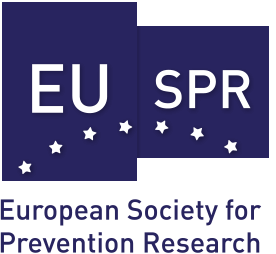| Name | Statement |
|---|---|
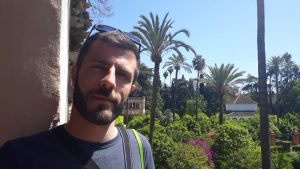 Giovanni Aresi | I am researcher and professor of Community Health Psychology at Università Cattolica del Sacro Cuore, Italy. My research focuses on young people's healthy behaviours, with a primary emphasis on the adoption of a participatory approach in conducting research and intervention evaluation. In EUSPR, I’ve been active in different ways, including during conferences, contributing to early career forum meetings and blogs, as well as member of the Society’s journal board. If elected, I’ll work towards three main goals: a) increasing EUSPR capacity of advocacy with decisionmakers and the public on the role of prevention in our society; b) further improving the potential of the Early Career Forum to support members in pursuing a career in prevention; and c) encouraging further discussion on conflict of interest in prevention research. |
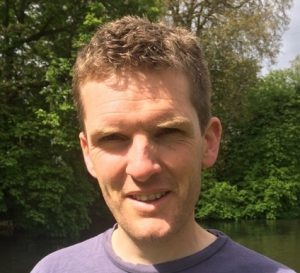 Nick Axford | I am honoured to have been nominated for the EUSPR Board. I have been a member of the EUSPR for over 10 years and contributed to all annual conferences from 2012 onwards. I am strongly sympathetic to its ethos and aims and believe this is reflected in my involvement to date and wider work. I led the working group to achieve the formal affiliation between the Journal of Prevention and EUSPR. This involved extensive discussions with the publisher (Springer) and potential editors and working with the new Editor-in-Chief to identify possible Associate Editors and Editorial Board members. The affiliation started in January 2022 and I now serve as a member of the Editorial Board. I have conducted research in a wide range of prevention science areas, including child maltreatment, youth violence and anti-social behaviour, school-based bullying and the social-emotional learning of young children. I think it is important that the EUSPR encourages and reflects a wide variety of prevention science interests and welcome the increased attention to climate change and associated challenges. I have been fortunate to work with colleagues in several European countries, including the European Communities that Care project, where I led a team reviewing evidence for the effectiveness of interventions in Europe. The results of this analysis were used to help populate the Xchange registry of interventions hosted by the European Monitoring Centre for Drugs and Drug Addiction (EMCDDA). I now sit on the Evidence Panel for Xchange. I am particularly interested in knowledge mobilisation and have contributed to several initiatives to help disseminate evidence-based programmes (e.g., Xchange, Blueprints in the US and the Early Intervention Foundation Guidebook in the UK). I continue to be interested in how such initiatives can evolve to better support getting evidence into practice. Although my recent work has had an emphasis on programmes and trials, I am very interested in other forms of intervention and impact evaluation and would seek to encourage these within EUSPR. For example, common elements and system-orientated interventions need more attention, as does theory-based evaluation. I would also encourage more attention to the social and economic drivers of poor outcomes and ways in which prevention science can better address those. I have enjoyed being part of the EUSPR Board since 2019 and hope to continue serving in that capacity and so help the society develop and flourish. |
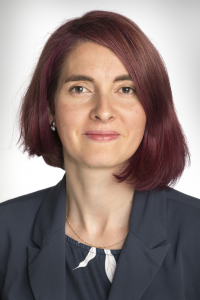 Angelina Brotherhood (Fotocredit: R. Ettl) | Hello, my name is Angelina Brotherhood. I am a Health Expert at the Addiction Competence Centre of the Austrian National Public Health Institute in Vienna as well as the prevention expert within Austria's REITOX National Focal Point to the EMCDDA. I am best known for my work to develop and promote the European Drug Prevention Quality Standards (EDPQS), as published by the EMCDDA. I also contributed to the UNODC/WHO International Standards on Drug Use Prevention. I have developed training materials and given numerous talks and workshops for policy-makers and practitioners to support the use of standards and help increase the quality of drug prevention activities on the ground, across Europe and beyond. As part of my current role, I am working to introduce the European Prevention Curriculum (EUPC) in Austria. I'm also currently active in the Western Balkans, thanks to a joint capacity-building project with EMCDDA on prevention and other drug-related topics. My other interests include environmental prevention and its theoretical basis, which is also a current focus of the EUSPR. I am a sociologist by training, which probably explains why I'm not scared to take on the role of the critical and questioning voice in discussions, when needed. I have assisted the EUSPR since its inception, initially offering administrative support and later acting as External Advisor to the Board of Directors. I then served on the EUSPR Board from 2014 to 2017. My main achievement in that period was to set up and establish the EUSPR's Early Careers Forum (ECF) to support and connect students working on prevention-related topics. I wanted to give them that sense of academic family and belonging which I myself experienced with EUSPR during my doctoral study years. I also supported the Austrian National Public Health Institute to host the EUSPR conference in Vienna in 2017. For me, the EUSPR has always been an excellent opportunity to foster professional relationships and knowledge exchange with colleagues across Europe and to develop ideas on how to advance prevention, and so I'm very excited to stand for election once again. If elected, I would initially contribute to the EUSPR's planned position paper on environmental prevention. I would also like to use my time on the Board to collaborate with fellow researchers, practitioners and policy-makers to explore and address the sensitive issue of how drug prevention activities are selected for funding in EU Member States. |
 Boris Chapoton | I have been a member of the EUSPR since 2015. I am currently working as a project manager at the Jean Monnet University, Saint-Etienne, France. Coming from a training background mixing Health Psychology and Public Health, I am using a Social Marketing approach to the projects I develop in order to change or maintain people’s behaviour for the better good of individuals and society. I have served the EUSPR as a board member for the last term (2019-2022). This period has tested the strengths of the links between each member of our community and between the members and the EUSPR itself. Although the historic members of the Society have reminded present through these years alongside with resilient members who believe in EUSPR objectives and philosophy; we cannot put aside the other members whom drift apart and the ones whom did not get to taste fully the EUSPR spirit because of our missed opportunities to meet face to face during our annual conferences. The actual European context keeps challenging our abilities to get reunited and for researchers, practitioners and policy makers to discuss preventive strategies and opportunities in a safe and optimistic environment. Yet, the Board and the EUSPR members have kept developing different initiatives to pursue and preserve the goal of our Society to develop and promote evidence-based prevention for the population. I am pride and delighted to have been able to participate to those initiatives. We still have much to do in order for our European Society’s to grow stronger and I have no doubts that, together, early and senior members will be able to keep consolidating our established roots made of excellence, collaborative opportunities, trust and kindness. I apply to the position of Member of the Society Elected to the Board to serve the EUSPR members for another mandate, to help re-establishing the links between members in positive perspectives and to keep developing our goal to disseminate effective preventive strategies. |
 Elena Gervilla | I am a PhD in Psychology, Associate Professor of Methodology and Statistics, and Deputy Director of the Psychology Department at the University of the Balearic Islands, Spain. My research mainly focuses on the evaluation of interventions to prevent addictive behaviors and mental health problems and the application of evidence-based preventive programs. The quality and warmth of the professional collaborations I have been part of at the EUSPR have been pivotal for my career as an advocate for mental health. Therefore, a meaningful goal set for the growth of our society is to foster collaborations and shared actions on effective change with colleagues from fellow scientific Societies, facilitating discussion and developing recommendations for tangible action plans in prevention. The purpose of these conjoint efforts will translate the evidence available into top-quality research, policy implementation and dissemination of resources in our community. Being nominated for future president from the EUSPR's community of supportive colleagues humbles me and fills me with pride equally. I would gladly commit to extending the reach of our society, strengthening the methodological aspects, and promoting our results while supporting the training of the next generation of scientists and practitioners in the upcoming years. It would be a great honor to continue serving the organisation that has allowed me to grow in the prevention science field. |
 Vasilka Lalevska | I am gladly submitting my statement that will hopefully support my candidature for the upcoming EUSPR Board of Directors election and bring closer to you my background and the areas where I could contribute to the future work of the EUSPR. My educational background is in Economics and Project Management, acquired in Skopje, North Macedonia, where I was born and raised, while most of my work experience has been acquired in Stockholm, Sweden, where I am currently based. The biggest focus of my work at the start has been policy from the aspects of carrying out advocacy and education activities, with particular focus on alcohol, narcotic drugs and prevention and control of non-communicable diseases. Today, this has expanded to financial regulation and sustainable finance, focusing on climate, environmental and importantly social issues. I have been a member of the EUSPR since 2017, and during the same year I started as Training Officer at the Committee of the EUSPR Early Careers Forum (ECF). The dynamics of my engagement with the ECF followed, in both intensity and topics, with the changes in my career path. In the period since, together with the team, we were able to organize several webinars targeted at Early Career members. Additionally, I was also engaged in abstract reviews and writing blogs mostly on the connection points between policy and research. My latest engagement was during the 12th EUSPR Conference, where I participated in the Climate Change and Health joint activity (SPR-BRAPEP-EUSPR) speaking about the opportunities in climate change for prevention research. The EUSPR already has an excellent platform for action and cooperation as well as varied and ambitious membership. To add to that, I would like to use my long-term experience working in the non-profit sector on national, European and global level to contribute to governance processes in the EUSPR and help the successful functioning of the organization together with fellow members. Additionally, I would be keen to work on strengthening the connection between the EUSPR and the Early Careers members in order to continue creating a safe space for discussion, learning and exchange of experience and expertise. For the upcoming three years, in addition to the existing scope of activities and work, I would imagine the EUSPR intensifying its efforts in exploring the interconnection between health, prevention science and climate change through defining key actions, possibilities for joint work and innovation as well as sharing best practices across the EUSPR. Lastly, as there are different global actions that often tackle some of the areas of relevance for prevention researchers, it might be relevant for the EUSPR to strengthen its awareness and seize opportunities that these developments offer, in terms of funding, cooperation and identifying research gaps/needs that could be of interest. I hope that my background and experience would be of benefit to the EUSPR and its membership and I look forward to the next steps in the process. |
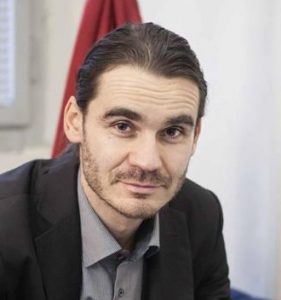 Michal Miovski | Prevention is representing very important piece of my professional life – and it was dedicated to almost 23 years long story since my first bigger project in prevention with Peer van der Kreeft on our Phare Twinning 2000, when we conducted national-wide needs assessment in the Czech Republic, and I have started to work on building prevention system in my country. We have created quite original national concept of school prevention, including databank of interventions, training and education workforce, quality standards and real quality assurance system. Paper about this story is in press and summarized this entire work as a case study. My team participated on EUDAP project, Nightlife, EUPC and many others and was honor to work with so many international partners and great teams. Our team created on-line international training INEP (4 language mutations now), based on EUPC and training is available for free. In 2012 we formulated and published first competency model for prevention professionals and work on it and up-date now. EUSPR was always important to me personally and my plan is to work on quality and especially on quality assurance systems and training and education for prevention professionals. That is also area to bridge science and praxis – e.g. we are running international Journal Addictology where practical oriented papers are welcome and where we are focus on applied science. I would like also emphasize EUSPR in international context and help and support linking EUSPR with other international relevant partners – Europe should not be isolated and I see many critical opportunities for collaboration outside of Europe at this moment. |
 Zila Sanchez | Despite being a professor in Brazil, since 2013, I have been working on evaluating and disseminating European programs in my country. In that year, I started my participation in EUSPR activities. My large-scale studies of national dimension allowed the adaptation of the Unplugged program and its dissemination as federal public policy in Brazil. It is worth noting that this is the first experience of a complete research cycle of the science of prevention at a federal level: adaptation, evaluation, readaptation, reevaluation, readaptation, reevaluation and dissemination on a large scale. Three adaptations of the program were necessary until a positive effect was found. In this process, I was responsible for creating an important network of researchers in Brazil who started to work with researchers and practitioners in Europe. Beyond that, I assumed the position of Editor-in-Chief of the Journal of Prevention, the Oficial Journal of the European Society for Prevention Research, for the quinquennium 2022-2026. The Journal has an editorial board of important European researchers members of the EUPR. We are working together to guarantee that the Journal contributes to all emerging areas in the field of prevention science, with an emphasis on behavioral interventions, linking academic research and professional practice. Each edition of the Journal seeks to ensure that the Journal reflects the Society's core mission. Thus, it is crucial to be part of the EUSPR Board of directors so that my work reflects the aspirations and positions of the Society in the content of the Journal. This will help the Journal to comply with the mission of the Society. |
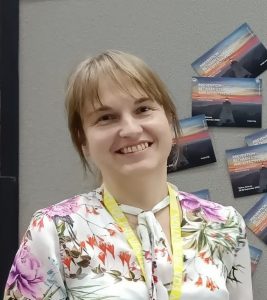 Karin Streimann | Karin Streimann is a researcher in Estonian National Institute for Health Development and a guest lecturer in Tallinn and Tartu University. She has educational background in social work (PhD in 2021, Tallinn University, School of Law, Governance and Society). Her work and research are interdisciplinary, involving the educational, social and health sector in the prevention of behavioural health problems such as externalizing and internalizing problems as well as substance use. She is interested in the intervention research as well as the systems perspective on prevention to understand how to raise the quality of prevention nation-wide. She is leading the Estonian Scientific Council on Prevention, where Estonian higher education institutions are partnering to support evidence-based decision making in the prevention field. She has been also involved in several European-level projects (UPC-Adapt, ASAP training, Frontline Politeia) that focus on the prevention workforce development. In my vision the EUSPR already has a strong connection with substance use prevention researchers, I would like to support its development cross-sectorally and attempt to involve partners who work in the other prevention fields. As many social, health, and educational problems are caused by the same factors I feel that a cross-sectoral approach is needed to succeed in prevention. I believe we could move towards a shared understanding of prevention across siloes, sectors and disciplinaries in EU level. |
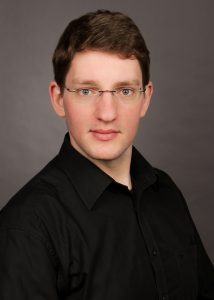 Samuel Tomczyk | Since 2017, I work as the Lead of the Early Careers Forum of the European Society for Prevention Research (EUSPR). In this role, I was fortunate to build networks with other early career researchers and more experienced colleagues from different professional backgrounds to strengthen the cross-disciplinary, evidence-based approach to prevention across Europe. For the future of prevention, I believe that it is important to provide a common understanding of the systems, dynamics, and processes of prevention science for early career preventionists, and to mutually create and develop strategies towards achieving sustainable development goals in the areas of health and prevention. In my eyes, the Early Career Representative in the EUSPR Board aims to connect early career preventionists‘ needs with senior colleagues‘ expectations, experience, and support. Therefore, as a candidate for the role of Early Career Representative in the EUSPR Board, I would like to expand the collaboration among early career preventionists and senior colleagues, for instance via mentoring programs (e.g., as reviewers for the Journal of Prevention), by establishing and promoting opportunities for international exchange and education (e.g., via the climate change action group), and by preparing webinars as well as meetings and workshops surrounding the annual EUSPR conference. |
 Rachele Donini | In the past 15 years, I’ve been involved in several European projects funded by the European Commission, with the general aim to enhance prevention science and evidence-based practice. In detail, the findings and results of the different projects contributed to: - build and disseminate the European quality standards - adapt the Universal prevention curriculum to the European context - professionalise the European prevention workforce (specifically decision, opinion and policy makers) based on the European prevention curriculum - analyse the European prevention systems and understand the impact of the prevention system on the delivery of prevention interventions - develop a European prevention curriculum addressed to implementers. In the past years, I’ve been training professionals on evidence-based prevention all over Europe, in collaboration with EMCDDA, and I have worked with international bodies in the prevention field. I have developed a rich and nurturing network with prevention professionals, working both on a European and International level. In my Country-Italy, I’m part of the current panel of prevention experts in charge of updating the National plan against drugs for the upcoming years. In case of nomination, I commit to serve EUSPR in the dissemination of Evidence- and Practice-based prevention across Europe and to increase dialogue and exchanges with other international bodies involved in the prevention field, such as WHO, UNODC, SPR, ISSUP, BRAPEP, APSI, COPOLAD and any other similar associations. I would nudge prevention professionals, practitioners, and policy makers to join the Society. The intent is to empower dialogues between the academic world, the everyday work of people in the field, and representatives that have a relevant role in the decision-making process on prevention policies at a national, regional or local level. As part of my role in the Society and with other board members, I would like to translate into practice the prevention science theories and contribute to bridging the gaps between science, practice and policies. |
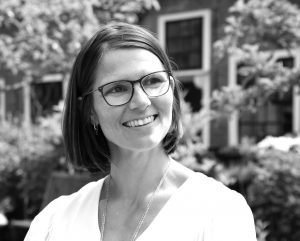 Ina Koning | Ina Koning is an assistant Professor at Interdisciplinary Social Science, Youth Studies, Faculty of Social and Behavioural Sciences, Utrecht University in The Netherlands. Koning has made a significant contribution to research associated with parenting and the prevention of adolescent substance use. She has extensive experience in leading diverse intervention studies where different phases in intervention development are carried out; from development and adaptation of interventions to process and outcome evaluation. Her research involves investigating the role of parents and the larger social environment in e.g. social media use and alcohol use. She has made a significant contribution to research associated with parenting and the prevention of adolescent substance use and problematic online behaviour; including research on environmental and digital interventions, and co-creation. Koning highly values the translation of her work to practice. She has a history of disseminating her work to utilize the knowledge gained in the most comprehensive way possible. I am looking forward working with dedicated, highly skilled and experienced professionals from around the world in designing activities for and with the society. Following up on the current and next president, I continue to advance the society by broadening the topics of interest addressed in the society through the annual EUSPR conference and the Journal of Primary Prevention. That is, where substance use is in origin the main focus of the society, addressing behavioral addictions as well may further broaden the scope of the society. Moreover, topics such as digital interventions, process evaluation and closing the practice-science gap are subjects that lie at the heart of my research. |
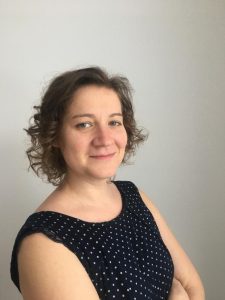 Helena Horalek | Since 2007 I have been working in the prevention of risk behaviour in cooperation with the Department of Addictology, 1st Faculty of Medicine, Charles University (CUNI). Since 2019, as a permanent employee in the assistant professor position at CUNI. I focus on quality and efficiency in preventing risky behaviour and training professionals in this area. I refer to effective strategies in the place of risk behaviour prevention at international professional meetings, including the implementation of quality control of primary prevention standards in practice. In the Czech Republic, I co-founded the Professional Society for the Prevention of Risky Behaviour, which actively advocates for quality control of standards in practice (certification system) and is dedicated to teaching and training future practitioners in prevention. As a treasurer, I will try to assist the EUSPR board in funding and finance. I will try my best to support the EUSPR Board in this area. I would also like to participate in and support EUSPR Board during discussions on the development of the EUSPR strategy. |
 Mariàngels Duch | As European Project Manager at the European Institute of Studies on Prevention – IREFREA, I am deeply involved in research and implementation of prevention programmes to address adolescents risk behaviours and enhance the impact of prevention research and practice at community and environmental level, through the capacitation of key stakeholders and their engagement in prevention policies and strategies. In addition, I actively participate in networks such as the EU Civil Society Forum on Drugs, to enhance prevention practice among its members and the work that their organizations develop, and collaborate in the progress and consolidation of the Spanish Best Practice Portal, coordinated by the National Plan on Drugs (PNSD), promoting the incorporation of the European Drug Prevention Quality Standards (EDPQS) among programme implementers and practitioners, through presentations and trainings, to expand a competent prevention workforce at national and European level. For the past two years, I have coordinated several actions to promote the incorporation of the European Prevention Curriculum (EUPC) among decision-makers, opinion-makers and policy-makers (DOPs) in Spain and engage policy making with prevention science. As a result of this work, during 2022 some trainings have been conducted (some more already scheduled) for the implementation and consolidation of the EUPC at government level in three regions of Spain. I have been a member of the EUSPR since its beginning, actively participating in the organization of several conferences as well as presenting research findings from the work developed by the IREFREA’s network. Since 2019, I have been acting as Secretary of the EUSPR Board establishing a firm working collaboration with the PNSD to consolidate the EUSPR at national level by means of developing activities, co-financed by the Spanish agency, to facilitate exchange of experiences between the European and the Spanish network, and contributing to the growth and active participation of the Spanish group at European level. In order to increase the impact of prevention research and prevention science in society it is absolutely necessary to connect the work undertaken by researchers, practitioners and DOPs. This is a goal for the EUSPR that I firmly believe in and I will keep joining forces to work towards it. |
